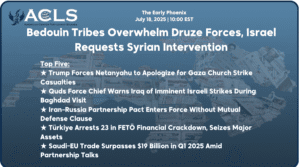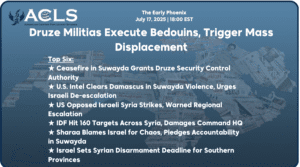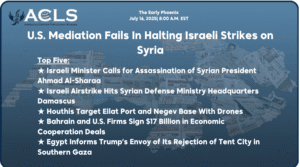The Arabian Gulf
Saudi and Qatari Push for Gaza Ceasefire as Iran Accuses Gulf Nations of Facilitating Israeli Trade
Last Tuesday, the Saudi Council of Ministers, led by King Salman bin Abdulaziz, concluded its session with a call for the Israeli military to be held accountable for their ongoing violations of international norms during the Gaza conflict that began in October. The Council stressed the need for international intervention to enforce a ceasefire in Gaza and protect the Palestinian population.
On Friday, discussions between Saudi Arabia’s Foreign Minister, Prince Faisal bin Farhan, and U.S. Secretary of State Anthony Blinken took place, focusing on the security and humanitarian challenges stemming from the Israeli offensive in Gaza.
Regional sources indicate that Saudi authorities have urged the U.S. to influence Israel to end the conflict, offering to help with Gaza’s reconstruction efforts in return. Riyadh insists on Israel’s commitment to a viable path towards establishing a Palestinian state as a condition for considering formal diplomatic relations.
Abdulaziz Al-Saghir of the Gulf ResearchSaudi Arabia and Turkey Center in Jeddah stated, “Saudi Arabia’s message to the U.S. includes ending the conflict, facilitating humanitarian aid, and committing to a lasting resolution that establishes a Palestinian state. Without these, Saudi Arabia’s options remain limited.”
Against the backdrop of global and regional instability, Saudi Arabia hosted the second Initiative Fund conference of the Islamic Alliance to Combat Terrorism, establishing a fund with a $26.6 million Saudi contribution. The Alliance, formed on December 15, 2015, now includes 42 Islamic countries, addressing the increased challenges and terrorism risks, particularly from the situation in Gaza. Led by Prince Bin Salman, the coalition aims for a unified strategy against extremism in regions like Iraq, Syria, Libya, Egypt, and Afghanistan, maintaining its commitment to fight terrorism with recent meetings underscoring the importance of collective action.
The foreign ministers of Saudi Arabia and Turkiye also discussed their unified stance for a ceasefire in Gaza on Saturday, condemning the hostilities and advocating for an Israeli military withdrawal to facilitate humanitarian aid.
A senior Israeli official, who chose to remain anonymous, indicated to Reuters that Prime Minister Netanyahu’s agreement to a Palestinian state is unlikely, though this does not deter Saudi Arabia or others from pursuing this goal.
Meanwhile, the Qatari Prime Minister urged the catastrophic repercussions of stopping funding to UNRWA working in several countries because of allegations regarding a number of its employees.
Yossi Cohen, former head of the Israeli Mossad, cautioned against Israeli officials’ public criticism of Qatar, which acts as a mediator in negotiations with Hamas for prisoner releases. Cohen emphasized Qatar’s unique position to mediate such an agreement, labeling the public critique as misguided.
During these regional diplomatic efforts, Iranian media reported that leading shipping companies, including an Israeli tech startup, are testing a new Middle East land trade route from the UAE and Bahrain through Saudi Arabia to Israel and Europe, bypassing the Red Sea’s security threats. This initiative, a response to attacks around the Bab al-Mandab Strait, seeks safer trade alternatives, facilitated by recent normalization agreements. Despite its limited capacity and dependence on regional stability, this route offers a strategic, albeit short-term, solution to ensure continuous global trade flow, underscoring the evolving dynamics of regional trade and geopolitical relations amidst ongoing tensions.



